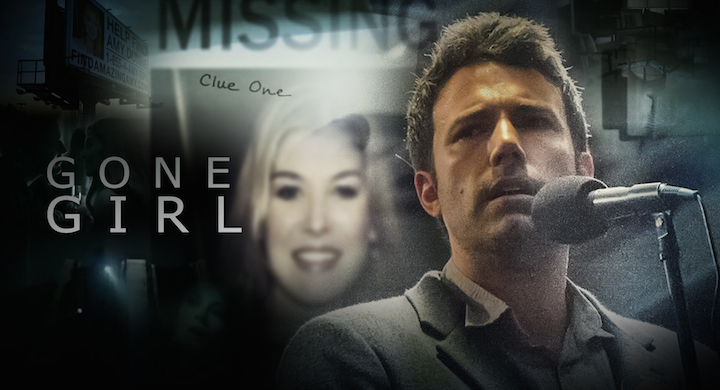SPOILER ALERT: This post reveals key plot twists in the recently-released film Gone Girl directed by David Fincher. The bottom line? I want my money back, and my dignity too.
Call me too Christian, too feminist, too prude, but Monday night’s screening of Gone Girl left me feeling hollow, my humanity scooped right out. What I hoped would be a psychological thrill ride turned into a descent into sexism, stereotypes, and unsettling answers. Under the light of the full moon, I walked to my car in the parking lot and wondered to God, “Is our imagination so small?”
The premise of the film, based on the book of the same name by Gillian Flynn, was enough to entice me: a wife gone missing, a husband accused. Maybe I expected the trope of the missing woman to have a twist. Or maybe I, along with the rest of the country, privilege stories about pretty, white girls gone lost.
Note to self: stop calling women over 18 girls; ask others to behave likewise.
You might have thought I was enjoying myself for the first half of the film: my feet propped on the back of the seat in front of me, my sit muscles not entirely asleep yet. At one point I leaned over to my partner and asked, “Can I tell you what I think happened?” to which he answered, “Absolutely not.”
The desire to be right distracted me from thoughts of what was right (Phil 4:8) as I anticipated the twist to come: There was no crime committed. There was no physical abuse present. The woman’s disappearance was a hoax to frame her husband. And then it hit me.
Oh, snap, I just accused a woman of crying wolf.
In a ‘culture of disbelief‘ where women are charged with overreacting to abuse, faking pregnancies, and generally manipulating men in ways both small and large, the last thing I want to see is a movie about a woman who cried wolf, least of all one who does it with such perverse pleasure. Stereotypical portrayals of women are not only boring. They are also irresponsible, tempting us to conflate one story for the whole story.
Note to self: it is never, ever okay to speculate someone’s pain is unfounded or exaggerated; defend the hurt to the point of foolishness.
The shining light in the film is the brief, but central, reflection on the way women go missing by choice, not in some elaborate scheme of abduction but in the daily decision to be someone’s idea of us rather than the real deal. The most moving scenes from the film were when the missing wife was first on the run. No longer under the pressure to be some guy’s “cool girl, ” high-society Amy dyes her hair the color of moss, moves into an musty cabin, and consumes a comical amount of Cheetos and Slim Jims. She is no longer an ideal in her husband’s eye or a character in her parents’ book franchise. Perhaps the violence she commits is not because she’s callous but because she’s unable to cope with her suffering.
Art at its finest is one way we cope with our suffering, as we escape reality as we know it and imagine new possibilities for our life and world. According to Walter Brueggeman, it is the job of the artist, like the prophet, to offer us alternative futures to the cultural (and largely patriarchal) one we’ve been given.
Think of Jesus and the woman at the well (John 4: 1-42). He offered her a better future for her life. He called her out of the shallow reality she knew – one limited by the stereotype that a Jew shouldn’t talk to a Samaritan or a man shouldn’t interact with a woman – and into a deeper reality as God’s real-deal beloved. Jesus essential says to her, “This worldview you’ve been drinking will leave you dry. I’ll show you a reality that sustains.” His words liberate her from a narrow view of herself and invite her to play a part in heralding a new world for others.
Gone Girl didn’t do that for me. Instead, my imagination was limited to a post-feminist world in which we are again “free” to be politically incorrect and it’s somehow okay for moviegoers to laugh when a woman claims rape. (Yes, this happened.) The whole experience made me feel like I conspired in my own diminishment.
Note to self: Stop paying filmmakers to paint your world small; choose a reality that sustains.

